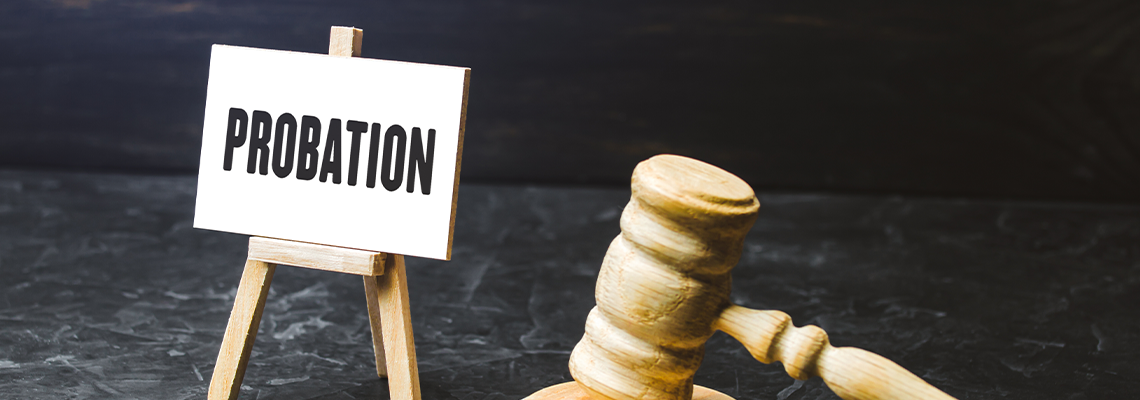
At Harrell & Paulson, we've seen how seemingly small missteps can lead to severe consequences. If you’re looking for guidance from a seasoned criminal defense attorney, you’ve come to the right place. Making it through the probation period after a criminal conviction can be a challenging process.
Probation, often seen as a second chance, provides individuals the opportunity to serve part of their sentence in the community rather than in jail or prison. However, successfully completing probation isn’t as simple as staying out of trouble—it involves adhering to a set of rules and responsibilities that many may not fully understand.
Allow us to walk you through the key steps to help you complete your probation period successfully while covering uncommonly discussed topics that many overlook.
Understand the Terms of Your Probation
One of the most critical steps in successfully completing your probation is fully understanding the court’s conditions. Many mistakenly believe probation is simply about "staying out of trouble," but it often involves several specific requirements.
Why it matters: Courts rarely accept ignorance as an excuse. Missing a probationary requirement, even unintentionally, can result in probation violation charges, which may lead to additional penalties or jail time.
Pro tip: Immediately after sentencing, ask your criminal defense attorney to go over every detail of your probation. If any terms are unclear, seek clarification from your probation officer or legal counsel. Keep a written checklist to stay on top of your obligations.
Fulfill Financial Obligations Early
An often overlooked element of probation is the financial responsibility that accompanies it. Many probation terms involve various payments, such as restitution to victims, fines imposed by the court, or fees for mandatory supervision and programs.
These financial obligations may seem manageable at first, but neglecting them can cause significant complications. Here’s a deeper look into the financial aspects.
Restitution: These are payments made to victims to compensate for damages or losses. This is typically a key condition of probation.
Court fines: These are fines levied as part of the sentencing. These are often non-negotiable and need to be paid in full.
Supervision fees: Probation supervision isn’t free. You may be required to pay monthly fees to cover the cost of monitoring your compliance.
Program fees: If you’re required to attend mandatory programs (e.g., anger management, substance abuse treatment), there may be fees involved.
Delayed payments: Even if you’re meeting all other probation conditions, failure to make timely payments can result in a probation violation.
Compounding fees: Late fees and penalties may accumulate if payments are missed, making the financial burden heavier over time.
Possible legal action: Unpaid obligations could lead to additional legal actions, such as extending your probation or leading to harsher penalties.
Why it matters: Some individuals underestimate the impact of unpaid fines or restitution on their probation status. Delays or non-payment can be classified as a violation, even if all other conditions are met. Financial obligations should be prioritized early in the probation period to avoid last-minute problems.
Pro tip: If you’re unable to meet your financial obligations due to genuine hardship, speak to your probation officer or consult your criminal defense attorney about possible alternatives. Courts may offer options like payment plans or community service in lieu of fines, but you must take proactive steps to address this issue.
Know the Impact of Travel Restrictions
One lesser-discussed yet critical aspect of probation is the travel restrictions often imposed on individuals. In most cases, probationers are confined to a specific geographical area, usually the county or state where they were sentenced.
These restrictions can complicate both personal and professional responsibilities. Here’s a breakdown of what you need to know.
Geographical boundaries: Most probation terms limit travel to a specific area, typically your home county or state. Leaving this area without permission is considered a violation.
Permission to travel: If you need to travel for personal or professional reasons, you must get prior approval from your probation officer. This approval isn’t guaranteed and requires valid justification.
Emergencies: Even in emergencies, leaving your designated area without notifying your probation officer can be classified as a violation.
Professional challenges: Work-related travel may be restricted, complicating employment if your job requires you to leave the designated area.
Family obligations: Travel restrictions may prevent visits to family members in other locations, which can strain relationships.
Travel out of state: In many cases, interstate travel requires approval not just from your probation officer but also from the supervising authorities in the destination state.
Vacations or leisure travel: Probationers generally aren’t allowed to travel for leisure purposes without special permission, making vacations challenging to plan.
Penalty for violation: Violating travel restrictions, even unintentionally, can result in serious consequences, including revocation of probation and possible jail time.
Special exceptions: Some probation terms may allow for more flexible travel, especially if travel is critical for your job, but this needs to be specified during sentencing.
Why it matters: According to the Probation Information Network, violating travel restrictions, even for seemingly minor reasons like a family visit or work trip, can be considered a serious probation violation. This is especially true if the probation officer or court isn’t informed in advance.
Pro tip: Always seek permission from your probation officer before leaving your designated area. In some cases, work-related travel or emergencies may be accommodated, but you must obtain prior approval. If travel is essential for your livelihood, consider asking your criminal defense attorney to advocate for more flexible travel conditions during sentencing.
Document Your Compliance
One often overlooked but crucial step in successfully completing probation is maintaining thorough documentation. Keeping detailed records of your compliance can serve as vital protection in the event of disputes or misunderstandings regarding your probation status.
Here’s how proper documentation can help.
Proof of compliance: Records serve as evidence that you’ve met probation requirements, such as attending mandated classes, paying fines, or completing community service.
Appointment logs: Document every meeting or communication with your probation officer, including dates, times, and what was discussed.
Financial receipts: Keep all receipts for payments made toward restitution, fines, and supervision fees to avoid any claims of missed payments.
Program completion: Obtain and save certificates or proof of completion for any mandatory programs (e.g., counseling, substance abuse treatment).
Community service records: If you’re required to do community service, make sure you get signed documentation verifying the hours you’ve completed.
Travel permits: If you receive permission to travel outside your designated area, keep copies of all approvals in case you’re questioned about your whereabouts.
Job-related exceptions: If your probation terms include exceptions for work-related travel or duties, document every instance in which you used those exceptions.
Health records: If you miss any probation requirements due to illness or medical issues, keep copies of doctor’s notes or other medical records as proof.
Communication records: Maintain written communication (emails, letters) with your probation officer or legal counsel to document requests, permissions, or clarifications.
Copies of court documents: Always have copies of your sentencing documents and any court orders related to your probation for easy reference.
Why it matters: Having a record of your progress, such as proof of payment, attendance at required programs, or complete community service hours, can be a valuable safeguard if your probation officer ever questions your compliance.
Pro tip: Create a probation binder or folder where you store copies of receipts, certificates, and any other documentation related to your probation. This level of organization demonstrates your commitment to fulfilling your obligations and allows you to have proof of your efforts if needed.
Work With a Criminal Defense Attorney
An attorney may be a valuable resource throughout this process. Call us at Harrell & Paulson today if you need help from a criminal defense attorney in Kaufman, Texas, or nearby areas, including Forney, Terrell, and Rockwall.



